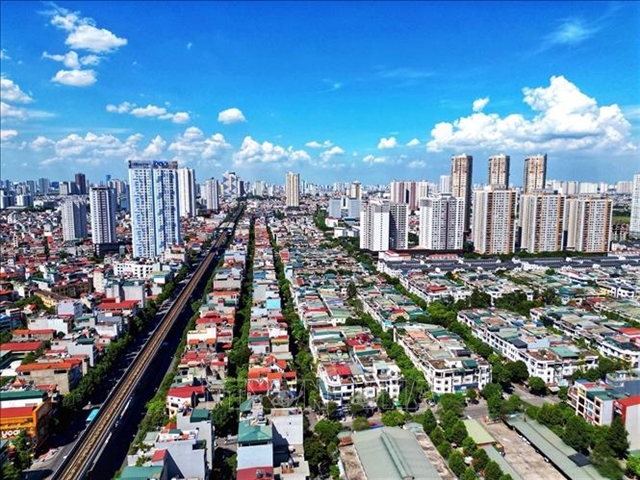 Business Beat
Business Beat


|
| A view of real estate projects in Hà Nội. 2023 was a difficult year for the Vietnamese real estate market. — VNA/VNS Photo Tuấn Anh |
Compiled by Vũ Hoa
HÀ NỘI — The domestic real estate market is believed to have reached the bottom and is expected to roar back to life this year thanks to a slew of measures taken by the Government, ministries, agencies and localities.
Speaking at a conference on Scenarios for Việt Nam Real Estate Market in 2024 held in Hà Nội on Friday, Nguyễn Văn Đính, chairman of Việt Nam Association of Realtors (VARS), said 2023 was a difficult year for the Vietnamese real estate market. The market saw a supply shortage as total supply for the whole year only reached 55,329 products. Although the figure posted a 14 per cent year-on-year increase, it equalled only 32 per cent compared to 2018, before the COVID-19 pandemic.
Very few new projects were approved, while thousands of unfinished projects were put on hold due to legal problems. A large number of projects were stalled due to lack of capital, which was the main cause of the problem, Đính said.
VARS statistics showed that currently only 46 projects had been completed with 20,210 apartments, reaching 4.7 per cent of the set plan in the period 2021-25.
Đính said that the investment demand was clearly affected when customers and investors gradually lost confidence in the real estate market. Although there were signs of improvement following the market's recovery, it had not yet regained its previous performance. In particular, the supply-demand imbalance was becoming more serious, along with the trend of tightening spending, causing demand to decline, requiring a plan to resolve this situation soon.
According to the VARS research team, the transaction volume still depended heavily on the quantity of supply. Total transactions in the four quarters of 2023 were: 2,700; 3,700; 5,778; 5,710 products and the absorption rate has gradually increased over the quarters. Total transactions for the whole year 2023 reached 18,600 products, equivalent to those in 2022, but only 17 per cent compared to 2018. The improvement in absorption rate was thanks to three main factors, mainly customers/investors were less pessimistic, and investors were more active in price reductions and applying a series of preferential policies. In addition, some projects were eligible to reopen, increasing choices for customers.
However, the housing prices have still been relatively high compared to both the real value and financial capacity of people, especially in two big cities with the average apartment price in Hà Nội of VNĐ51.7 million (US$2,120) a sq.m and VNĐ71 million ($2,912) in HCM City. For the land segment, high-value villas or townhouses, investors accepted a loss of 30 – 40 per cent compared to the fever peak. However, this condition has been basically controlled and stabilised over time. In localities with clear signs of recovery, selling prices in these segments have plateaued, and in some places even increased slightly by 3-5 per cent.
Hoàng Hải, the director of the Department of Housing and Real Estate Market Management under the Ministry of Construction, stated that since the beginning of 2023, the Government had taken decisive action and relevant ministries had promptly participated in resolving "bottlenecks" in land procedures, credit and bonds.
Alongside the prompt issuance of policies, significant progress had been made in the legal framework with the adoption of two important laws that greatly impact the market: the amended Housing Law and the amended Real Estate Business Law. Notably, the Government's working group had reviewed, encouraged and promptly addressed challenges faced by numerous real estate projects in various localities. However, implementation at the local level remained limited despite having some changes, Hải added.
The Government and Prime Minister Phạm Minh Chính had issued various documents and organised many conferences to get opinions from businesses, people and experts on ways to remove difficulties for the market.
Notably, the Government’s Resolutions 33/NQ-CP and No 97/NQ-CP had identified solutions, one of which is that real estate firms should prioritise paying debts and consider restructuring prices and products based on the real demand, said Lê Hoàng Châu, Chairman of the HCM City Real Estate Association.
Another was Decree 08/2023/NĐ-CP which removed problems in the individual and corporate bond markets, he added.
At the same time, the central bank has focused on perfecting the legal framework, streamlining procedures, and increasing preferential credit packages to make it easier for people and enterprises to access bank loans, according to SBV Standing Deputy Governor Đào Minh Tú.
Gradual stabilisation since late 2024
Đính expects 2024 to mark the final stage of overcoming obstacles in the Vietnamese real estate market. The market will gradually achieve stability, potentially leading to a more positive outlook. This change represents a shift towards the starting line rather than actual development, as the market moves away from its previous negative state. Nevertheless, this progress serves as a solid foundation for the market to prepare for a new cycle of development that is characterised by stability, sustainability and effectiveness.
Through the purification process, the internal health and ability to adapt to difficulties and challenges of entities existing in the market will be improved, according to Đính. Although the changes in the new law have not yet been applied, they will be a positive signal for subjects to place their trust and morale in preparation for the upcoming period. Along with solutions to remove legal difficulties and capital sources for the real estate market, the "trust" of customers and investors will continue to be a factor of concern and focus to relieve the problem in 2024.
VARS forecast that in the first and second quarters of 2024, the market would continue to maintain good signals from the end of 2023. But it would be from the end of the third quarter onwards that the recovery will be clearly shown.
Experts, however, pointed to outstanding challenges in terms of institutions, credit loans, bonds and the implementation of mechanisms and policies in localities.
Nguyễn Quốc Hiệp, Chairman of GP Invest, said there were almost no new projects at present owing to legal problems, which was also the main cause behind the supply-demand mismatch.
Given this, he suggested localities actively engage in reforming administrative procedures and untangling knots for ongoing ones. He also pinned hope on a new Land Law, saying that it would decide the recovery of the property market.
Economist Cấn Văn Lực held that the rebound would be seen more clearly from the second quarter of this year when the Government’s incentives begin to work, financial cases are settled, and the corporate bond market sails through the rough time. — VNS




